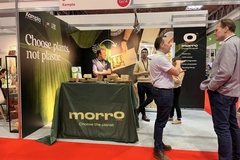
17 Jan 2019 --- A notable collaboration between Nestlé and Danimer Scientific may produce a marine biodegradable water bottle prototype in the next two to three years. The partnership is part of the company’s broader plan to reach its “waste-free future” vision. The plan looks beyond recycling, to include further investment in research alternatives to plastic material.
Nestlé pledged in 2018 to make 100 percent of its packaging recyclable and reusable by 2025, with a particular focus on avoiding plastic waste.
“While we are committed to pursuing recycling options where feasible, we know that 100 percent recyclability is not enough to successfully tackle the plastics waste crisis. We need to push the boundaries and do more,” says Nestlé CEO Mark Schneider.


Nestlé pledged in 2018 to make 100 percent of its packaging recyclable and reusable by 2025, with a particular focus on avoiding plastic waste.
Danimer Scientific, a developer and manufacturer of biodegradable plastic products, will work with Nestlé to design and manufacture bio-based resins using Danimer Scientific’s PHA polymer, coined Nodax.
A prototype bottle is expected in two to three years, Caroline Biétry, Corporate Spokesperson for Nestlé, tells PackagingInsights. The prototype would then be tested and assessed under local conditions, in both developing as well as developed markets, she notes.
In 2018, the University of Georgia, US, confirmed in a study that Nodax PHA is an effective biodegradable alternative to petrochemical plastics. PepsiCo, an existing partner of Danimer, may also gain access to the resins developed under this collaboration.
“Researchers have shown that PHA biodegrades in a wide range of environments, including industrial and home compost, soil and fresh and seawater,” says Stephen Croskrey, CEO of Danimer Scientific. “As a material that is reliably biodegradable across both aerobic and anaerobic conditions, our Nodax PHA is an ideal fit to drive the creation of eco-friendly packaging for Nestlé’s products.
Nodax PHA is also a suitable feedstock for industrial compost, home compost and anaerobic digester facilities, as well as reuse through recycling, Croskey explains.
“Nestlé Waters is committed to addressing the growing global plastic waste packaging issue. A biodegradable bottle, which is also recyclable, can help improve the environmental impact of our business in countries without collection and recycling systems,” says Maurizio Patarnello, CEO of Nestlé Waters.
However, it could be said that a plastic bottle – biodegradable or not – still constitutes plastic waste. Although the introduction of a biodegradable water bottle would grab headlines and move Nestlé closer to its 2025 goal, industry professionals have expressed concern.
Director of Emagine Packaging Richard Coles tells PackagingInsights that there is a question over whether biodegradable options will, in practice, derive a true environmental sustainable benefit.
“The biophilic nature and potentially lower carbon footprint of biomaterial packaging derived, for example, from bamboo, sugar cane, palm fiber, seaweed, coffee waste and mushrooms appeal to eco-aware consumers who are prepared to pay a premium. However, issues may arise around the material’s recyclability and other ecological (as well as social) impact considerations,” says Coles.
However, Nestlé has also created its Institute of Packaging Sciences to evaluate and develop various sustainable packaging materials and to collaborate with industrial partners to develop new packaging materials and solutions.
Within the institute, explorations on new paper-based materials and biodegradable and compostable polymers that are also fully recyclable will be conducted. This could become a valuable option in places where recycling infrastructure does not yet exist and will not be available for some time.
The company has also initiated a collaboration with PureCycle Technologies to produce food-grade recycled Polypropylene (PP). PureCycle Technologies is commercializing recycling technologies which can remove color, odor and contaminants from plastic waste feedstock in order to transform it into virgin-like resin. Polypropylene is a polymer commonly used for packing food in trays, tubs, cups and bottles.
Global companies can no longer avoid the pressures surrounding the use of plastic. Yesterday, 30 companies joined forces to launch the Alliance to End Plastic Waste (AEPW).
Comprising companies from across the plastic value chain, including petrochemical companies ExxonMobil and Shell, consumer companies Dow and Procter and Gamble (P&G), as well as recycling companies Veolia and Suez, the alliance has pledged US$1.5 billion towards plastic recycling and clean-up efforts over the next five years.
Speaking during the live launch of the Alliance, David Taylor, Chairman of the Board, President and CEO of Procter & Gamble and Chairman of the alliance, highlighted the wide range of companies from across the plastic value chain as a key strength. This strength, according to Taylor, separates the AEPW from other groups looking to tackle plastic waste.
Designing plastic products to be optimized for recyclability appeared to be a key goal of the alliance, as well as strengthening recycling infrastructure and cleaning up plastic waste that is already littered across the globe – starting in Southeast Asia.
The alliance did not, however, call for bans on single-use plastics or for plastic production to cease, which angered some NGOs. In response to groups who call for an end to plastic completely, Jim Fitterling, Chief Executive Officer at Dow, stated that, ultimately, “we all have one common goal. We want to create a better value for plastic and a circular economy. Regarding banning plastic, the sustainable value of plastics is actually undeniable.”
By Laxmi Haigh












